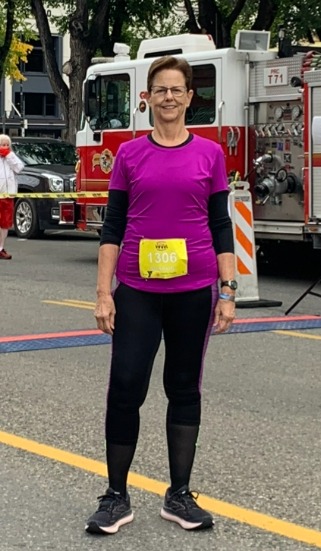You Have to Walk to Run: Sharon Krawl’s Path to Reclaiming Running After Brain Injury
By Sharon Krawl
In this week’s story, Sharon Krawl shares her story of survival and resilience following a brain injury – and how she eventually worked her way being a virtual Run, Walk & Roll participant in 2019.
“After my accident, I was running with a different purpose. I ran for all those who, for whatever reason, are unable to run. Not all injuries are visible, but I was when I ran.”
You Have to Walk to Run: Sharon Krawl’s Path to Reclaiming Running After Brain Injury
By Sharon Krawl
In this week’s story, Sharon Krawl shares her story of survival and resilience following a brain injury – and how she eventually worked her way being a virtual Run, Walk & Roll participant in 2019.
“After my accident, I was running with a different purpose. I ran for all those who, for whatever reason, are unable to run. Not all injuries are visible, but I was when I ran.”
I took up running rather late in life, in my mid-fifties. I started running 5K races and slowly working up to running 10Ks. Feeling comfortable with my running, in May of 2015 I decided to challenge myself and registered for the 2016 Rock n Roll Half Marathon. To prepare for that half marathon I signed up with a group in August.
Little did I know how my life was going to change.
On August 22, 2015, as I began my second week of training, a bicyclist who was trying to avoid colliding with another cyclist who had cut him off slammed into me. I happened to be in his direct path. My injury was severe enough that I went to the hospital where I received a CAT scan. That revealed a skull fracture and brain bleed, so I was transferred to a Level 1 trauma center. I spent the next 3 days in ICU. The bleed stopped on its own, so no surgery was required.
The next morning, the head neurological ICU doctor stood at the foot of my bed and said, “The hand of God was definitely on you yesterday. I’ve seen your CAT scan and there is no way you should be in the condition you are in based upon what I have seen on your films.”
That was a very sobering statement for me to hear. After being released, I spent three weeks at the Banner Concussion Center doing outpatient physical and vestibular therapy. After five weeks of complete rest and only working part time, I returned full time to my job as a high school counselor.
Once I was done with treatment, I gradually returned to running. It was like starting over from scratch, but it also felt really good to be doing what I enjoyed again. I literally took it one step at a time. Since I had already signed up for several runs prior to being injured, my focus was eventually being ready to run in those races. I believe it was only by the grace of God that I was able to achieve my goal and participate in the runs I had scheduled. However, I did change to a 10K race instead of doing the half marathon.
It was a challenge to get back into running because of fear. Fear of falling, fear of being in a big crowd, fear of being tripped, etc. But I refused to allow my fears to take away the enjoyment and the feeling of accomplishment every time I cross the finish line.
I am now 71, retired, and continued to run (mostly 5Ks) until some hip issues forced me to stop. And while I did not sustain any physical impairment due to my traumatic brain injury, or TBI, I do have short term memory loss and other slight speech issues.
Still, my recovery running stays with me. When I first started running, I was very competitive with myself. I always wanted to best my time on a previous run. After my accident, I was running with a different purpose. I ran for all those who, for whatever reason, are unable to run. Not all injuries are visible, but I was when I ran.
ABOUT BRAIN INJURY ASSOCIATION OF ARIZONA
The Brain Injury Association of Arizona (BIAAZ) is the only statewide nonprofit organization dedicated to improving the lives of adults and children with all types of brain injuries through prevention, advocacy, awareness and education. BIAAZ also houses the Arizona Brain Health Resource Center, a collection of educational information and neuro-specific resources for brain injury survivors, caregivers, family members and professionals.
What began in 1983 as a grassroots effort has grown into a strong statewide presence, providing valuable life-long resources and community support for individuals with all types of brain trauma at no charge.

